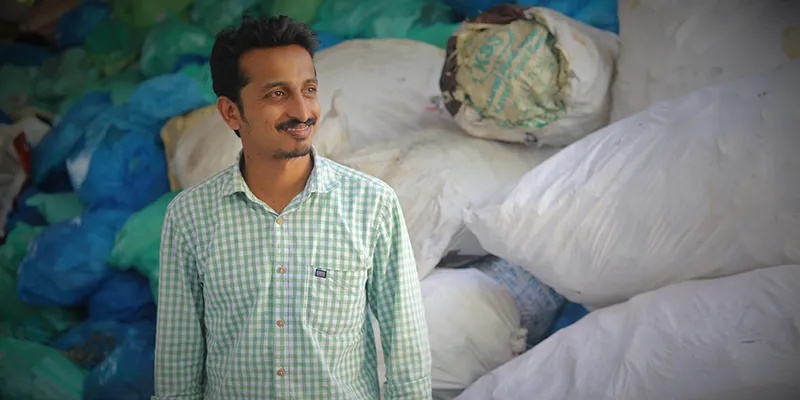120 employees, 5 districts, Rs 2.5 Cr annual turnover - Kozhikode-based Green Worms is turning trash into money
Kozhikode-based startup Greenworms manages 450 ton of dry waste per month, runs three recycling units and 11 material recovery facilities.
Startup: Greenworms
Founders: Jabir Karat
Year it was founded: 2014
Where is it based: Kozhikode
Sector: Waste management
Funding raised: Rs 80 lakh
Jabir Karat grew up in the town of Thamarassery in Kozhikode district of Kerala. Son of a plantain leaf supplier to local eateries, Jabir left for Delhi after school, to pursue graduate and post-graduate studies. After graduation, inspired by the likes of environmentalist Sunderlal Bahuguna, Jabir decided to take part in green causes. Jabir was selected for Gandhi Fellowship provided by Kaivalya Education Foundation of New Delhi and opted to work in slums of Mumbai and interacted with people in the waste management industry, visited dumping yards and learned aspects of the urban waste management industry in India.
“After college and the Gandhi Fellowship, I decided to work in the development sector. I did a bit of travelling and research to understand problems our country is going to face in the coming decade, and I found that unscientific garbage disposal is a relevant issue that needs to addressed and can potentially be a future social business,” says Jabir, on why he decided to work in waste management.
Jabir started Green Worms in November 2014 in Kozhikode with Rs 5 lakh capital and a five-member team in a remote village. They struggled the first one-and-a-half years, had to temporarily close the company twice, and Jabir took up another project for six months to be able to restart Green Worms.
However, today, Green Worms is an organisation with 120 employees, spread across five districts in northern Kerala, and manages 450 ton of dry waste per month, runs three recycling units and 11 material recovery facilities, with an annual turnover of Rs 2.5 crore.

Green Worms has raised a capital Rs 80 lakh so far. It charges a monthly waste disposal fee from the waste producers, based on the quantity and quality of waste generated and kind of services expected. Secondary source of revenue is from the segregated waste materials and its value generated through recycling process. They also resell a few products like individual household composters, community composters and eco-friendly cutlery.
The current consumer base includes individual homes, apartments, gated communities, school canteens, malls and shopping complexes. Other than waste collection, they also offer composting solutions to homes and businesses, as well as event waste management services for weddings, conferences and exhibitions.
In an effort to raise awareness about scientific waste management, Green Worms provides training in educational institutes and municipal waste management consultancy to local city corporations. “Government is a major stakeholder in this business, and your success will depend on how well you can work with government agencies and quality of work you deliver on the ground. Many municipalities have realised that private players need to be incorporated for running an efficient waste management system,” adds Jabir on the need for the private and public sectors to work together in the waste management industry.
“Expanding to major cities in Kerala is our immediate plan, while we are willing to take up projects in other parts of the country, if provided with required local support. Our aim is to be a company with multi-crore turnover and which creates employment for 10,000 people by 2028. We are in the process of second level of fundraising which will enable us to integrate technology in operations, branding and hiring good talent to scale up the business,” shares Jabir on his future expansion plans.
Unscientific waste management remains the bane of most Indian cities, with local government bodies unable to solve the problem. The impact and growth of social business startups like Green Worms is a testament to the role private companies can play in civic issues. The private sector waste management market is largely unorganised and remains localised. Indian municipal solid waste (MSW) management market is expected to grow at a CAGR of 7.14 percent by 2025, to US$ 13.62 billion, according to a report by market research consultancy Novonous.







